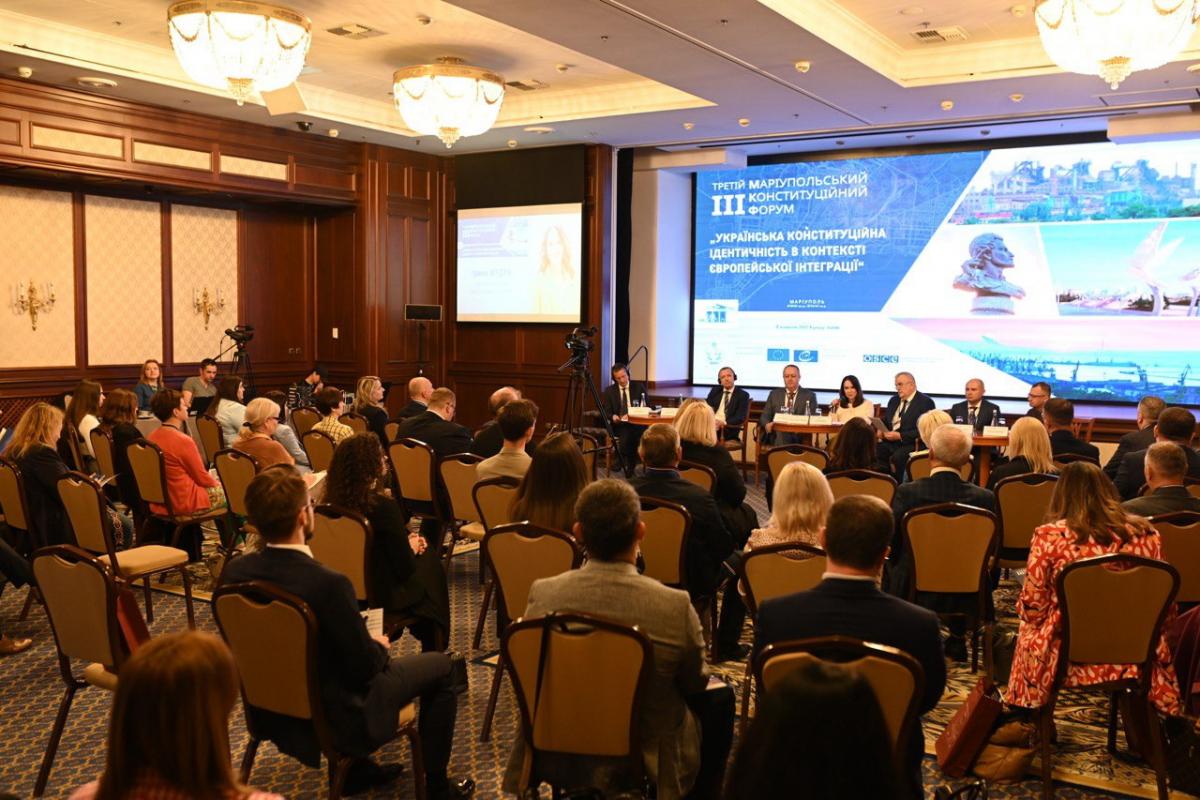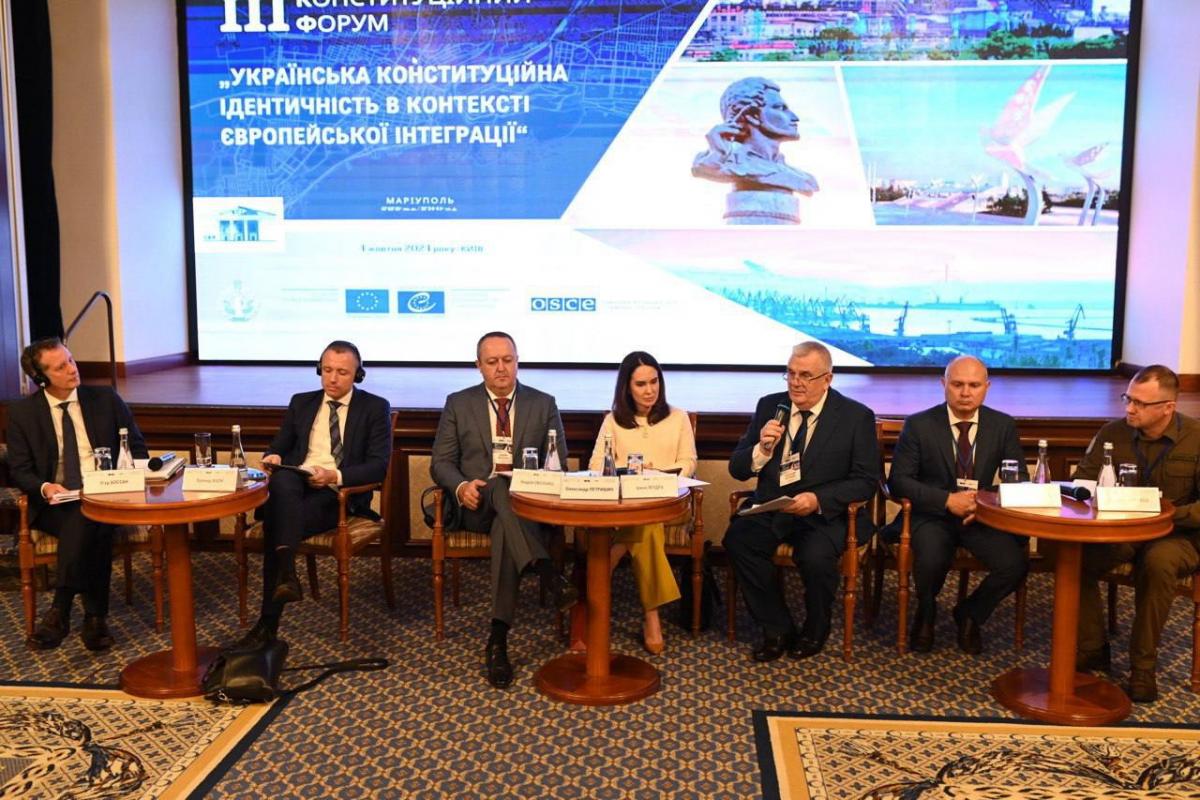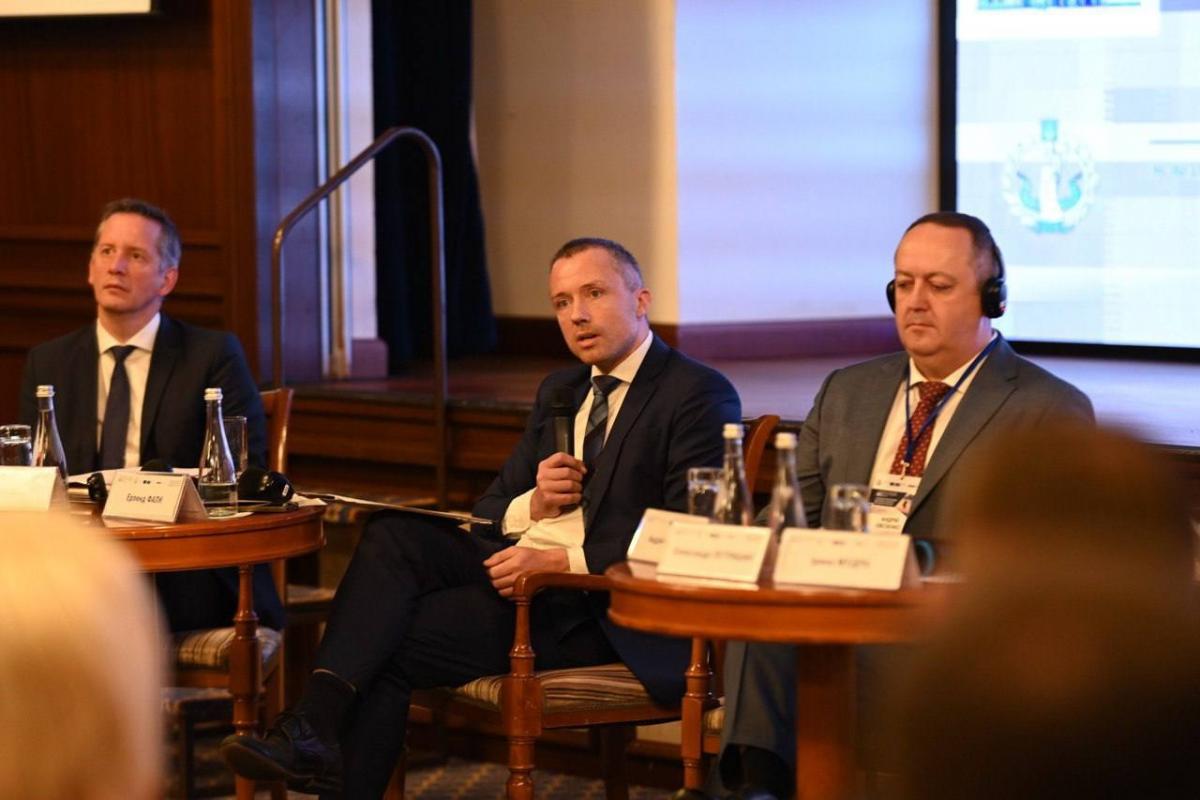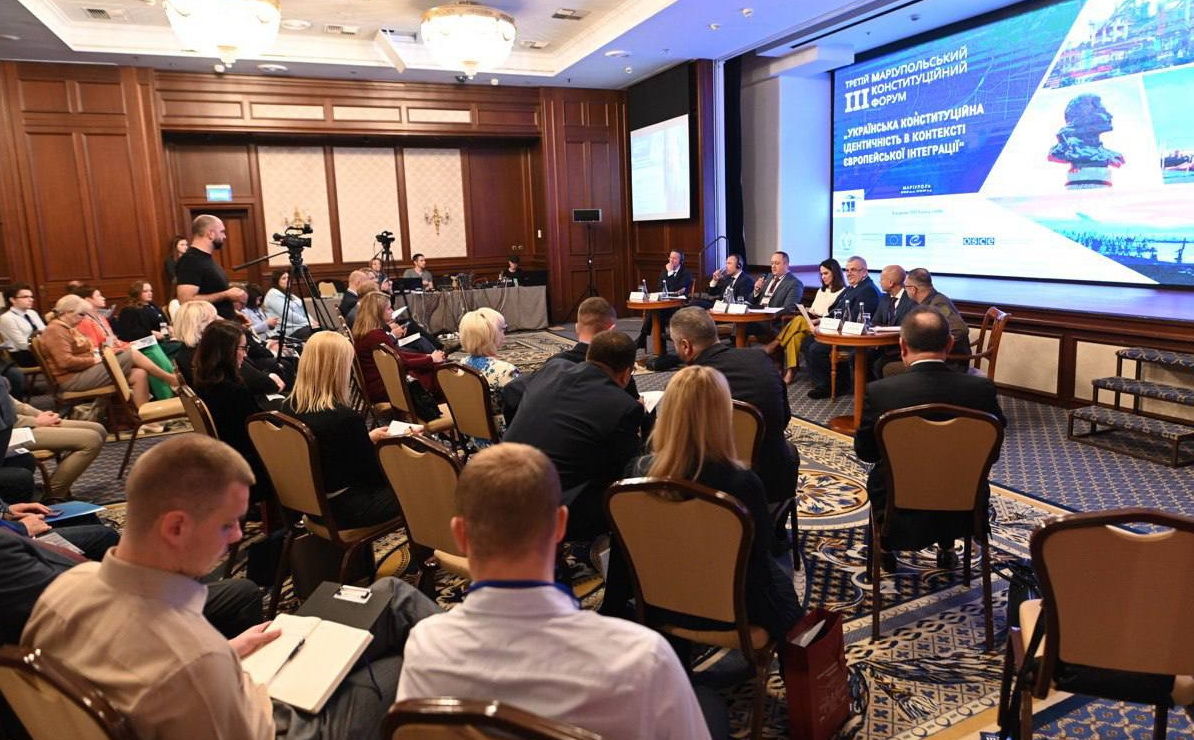October 4, 2024
Today, on October 4, 2024, the Third Mariupol Constitutional Forum “Ukrainian Constitutional Identity in the Context of European Integration”, organised by the Constitutional Court of Ukraine with the support of the Council of Europe Office in Ukraine and the OSCE Support Programme for Ukraine, is taking place in Kyiv.
The event brought together legal practitioners, scholars, national and international experts, representatives of bodies of state power and educational institutions to analyse the current challenges our state facing.
The Constitutional Forum was opened by the Judge of the Constitutional Court of Ukraine Oleksandr Petryshyn, who on behalf of the Court addressed the participants with a welcoming speech and stated that the topic of the Forum is extremely relevant, given the difficult conditions in which our state is currently engaged.
The CCU Judge recalled that the First Mariupol Constitutional Forum was held in September 2021 in Mariupol at the initiative of the Constitutional Court of Ukraine and with the support of our international partners. The event was dedicated to a complex topic: “Human Dignity and Human Rights Protection in the Context of Social Transformations”, and it provided an opportunity to discuss important social issues.
The Second Mariupol Forum was held in October 2023 in Kyiv and was the next stage in the development of this tradition. The event was dedicated to constitutional challenges in the context of the post-war recovery and European integration of Ukraine.
“And today we have assembled again, at the Third Forum, to continue an extremely important discussion about the future of our state and its constitutional identity,” the CCU Judge underscored. He emphasised that the participation of leading scholars, national and international experts is crucial and will provide an opportunity to get new ideas and approaches to addressing current issues.
Oleksandr Petryshyn expressed his gratitude to the Armed Forces of Ukraine, defending our state on the battlefield.
Deputy Head of the Office of the President of Ukraine Iryna Mudra, in her opening remarks, stressed the importance of the topic, noting that today the Ukrainian constitutional identity covers key principles, values and norms that define the foundations of Ukrainian statehood, socio-political system and legal system. The principles on which the Ukrainian constitutional identity is based are sovereignty, independence, democracy, the rule of law, high standards of human rights and freedoms, and equality of all before the law.
“The constitutional identity of Ukraine is formed on the basis of the historical experience of state-building and modern aspirations for integration into the European legal space, while preserving national identity,” speaker pointed out. She underlined that the rule of law, independence of the judiciary and protection of fundamental freedoms are key elements of the European legal tradition.
According to her, the discussion around this topic requires attention to the threats to constitutional identity posed by the armed aggression of the Russian Federation, which has been going on for more than 10 years; the challenges and opportunities for state-building that arise in the process of integration into the European community of Ukraine; the components of constitutional identity and the role of the Constitutional Court in its preservation and further development.
The participants of the event were addressed by Pierre Baussand, Chief of Operations of the OSCE Support Programme for Ukraine. He expressed his deep gratitude and admiration for the Ukrainian people, noting their unparalleled resilience in a war that has been lasting for ten years.
Over the past few years, Ukraine has gone through many important events. It was granted EU candidate status, and yesterday NATO Secretary General Mark Rutte assured that he looks forward to the day when Ukraine becomes a Full Member of the Alliance. This is a tremendous achievement for a country that continues to struggle and at the same time undertake large-scale reforms.
Pierre Baussand emphasised that it is Ukrainians who have become the cornerstone of their state’s stability and they have a key role to play in its future. In this context, he called for special attention to be paid to discussing the gender aspect of the constitutional identity of Ukraine.
He also stressed the importance of respecting the fundamental rights of every citizen and underlined the role of the Constitutional Court as a fundamental institution for ensuring the rule of law.
Erlend Falch, Deputy Head of the Council of Europe Office in Ukraine, welcomed the recent positive developments in the field of constitutional justice. He assured that the Council of Europe will continue to provide unwavering support to Ukraine, helping it to align its constitutional processes with European standards.
According to him, the Council of Europe has three core goals: democracy, the rule of law and the protection of human rights. These principles are the cornerstones of the organisation’s activities, which attaches particular importance to the role of the Constitutional Court of Ukraine as a guarantor of these values, in particular in the context of the country’s constitutional identity.
Erlend Falch also emphasised the importance of adhering to European standards of justice, especially in the work of the Constitutional Court Judges. He emphasised the need to study the case law of the Court of Justice of the European Union, as this is even more important in view of Ukraine’s status as a candidate for EU membership.
He concluded by expressing his admiration for the resilience of the Ukrainian people, who defend their national identity on the battlefield and continue to uphold European values: democracy, human rights and the rule of law.
Andrii Ovsiienko, Representative of the Commissioner in the Courts System and Rights to Fair Trial and Representation in the Constitution Court of Ukraine, Oleksii Smyrnov, First Deputy Head of Luhansk Regional State Administration, and Andriy Rempel, Acting Deputy Mayor on the activities of the executive bodies of the Mariupol City Council, also addressed the participants of the event with welcoming speeches. They emphasised the significance of constitutional identity of Ukraine in the context of war, European integration and the challenges facing the state.
The programme of Forum includes discussion of many key issues, including not only constitutional identity, human rights, gender equality, but also others that have a direct impact on the future of our state.
The first plenary session was devoted to the topic “Constitutional identity and war”, moderated by the Judge of the Constitutional Court Olga Sovgyria.
Vasyl Lemak, the Judge of the Constitutional Court of Ukraine, delivered a report on “What is the constitutional identity of Ukrainians?”.
The Judge identified three key aspects through which the constitutional identity of Ukrainians can be understood.
Firstly, constitutional identity expresses how the text of the constitution interacts with national selfhood. It refers to how constitutional provisions reflect the values important to society. Vasyl Lemak drew attention to Articles 10 and 12 of the Constitution of Ukraine, protecting the language and cultural identity of Ukrainians, as well as Article 20 of the Fundamental Law of Ukraine, which embodies state symbols. He mentioned that the key element is the preamble of the Constitution, which contains the term “identity” and emphasises the irreversibility of European and Euro-Atlantic course of Ukraine.
Secondly, Vasyl Lemak underlined the importance of the “core” of the Constitution, which encompasses such fundamental principles as human rights, independence of the state and its territorial integrity. He noted that the Constitutional Court is responsible for protecting this core. The Judge underscored that the protection of rights and freedoms is an important element of the constitutional identity of Ukraine and cited several important decisions of the Constitutional Court in this context.
The third aspect is European integration and the protection of the sovereignty of Ukraine in the context of accession to the EU and NATO. Vasyl Lemak noted that the delegation of some sovereign powers to a higher, European level does not diminish the sovereignty of the state, but rather strengthens it. Representatives of Ukraine in European institutions will be able to participate in decision-making at the international level, which raises the level of exercise of sovereign functions.
The Judge also noted that after the amendments to the Constitution of Ukraine in 2019, the movement of Ukraine towards the EU and NATO was enshrined as a constitutional value. This is no longer a political choice, but a constitutional norm that all public authorities must adhere to. He stressed that European integration has become part of Ukraine's constitutional identity, and this determines its future development.
The Judge also noted that after the amendments to the Constitution of Ukraine in 2019, the course of Ukraine towards the EU and NATO was enshrined as a constitutional value. This is no longer a political choice, but a constitutional norm that all bodies of state power must adhere to. He stated that European integration has become part of the constitutional identity of Ukraine, and this determines its future development.
This session was addressed by Iurii Barabash, Vice-Rector for Research and Academic Affairs and Strategic Development, Yaroslav Mudryi National Law University, Chairman of the Scientific and Advisory Council of the Constitutional Court of Ukraine, Olena Boryslavska, Head of the Constitutional Law Department, Law Faculty, Ivan Franko National University of Lviv, Oksana Shcherbaniuk, Head of the Department of Procedural Law, Faculty of Law Yuriy Fedkovych Chernivtsi National University, Professor at the Faculty of Law, Vilnius University.
The second session was devoted to the topic “Components of constitutional identity: a view from Kyiv, Strasbourg and Brussels”. This session was moderated by Judge of the Constitutional Court of Ukraine Viktor Gorodovenko.
In his speech, Judge of the Constitutional Court of Ukraine Serhiy Riznyk emphasised the importance of discussing complex and multi-component issues in order to obtain conclusions that can be effectively implemented in the activities of, in particular, the Constitutional Court of Ukraine
Serhiy Riznyk proposed one of the possible definitions of the concept of “constitutional identity”. According to him, it is a unique system or configuration of constitutional values that:
firstly, recognised by each person at the individual level;
secondly, unite people into a community, a political nation that adopts the Constitution, where these values are embodied;
thirdly, they are protected and respected by the state formed on the basis of such values.
According to the judge, the constitutional identity is a key characteristic of a constitutional state, in which the people, united by common values, are the only (united) source of power.
Serhiy Riznyk also focused on the differences between universal constitutional values and national constitutional values.
The rule of law and human dignity are universal values of Western civilisation that unite the Ukrainian people no less than national values. It is these values that distinguish Ukraine from autocratic regimes and immature nations.
Serhiy Riznyk emphasised the special role of the Constitutional Court in shaping the constitutional identity of Ukraine. He noted that in the Decision of the Constitutional Court of Ukraine on ensuring the functioning of the Ukrainian language as the state language, the term “constitutional identity” is mentioned more than ten times. In addition, there are other decisions of the Constitutional Court that, along with the affirmation of universal values, contribute to the development and strengthening of national constitutional values.
This session also featured speeches of Mykola Gnatovskyy, Judge to the European Court of Human Rights in respect of Ukraine, Oleksandr Vodiannikov, Senior Project Associate, the OSCE Support Programme for Ukraine, and Mykola Onishchuk, Rector of the National School of Judges of Ukraine.
“Gender Dimension of Constitutional Identity” was the topic of discussion at the final plenary session, moderated by Judge of the Constitutional Court of Ukraine Galyna Yurovska.
In his speech, Judge of the Constitutional Court of Ukraine Oleh Pervomaiskyi focused on understanding the concepts of sexual and gender identity in the research of scientists.
The Judge stated that these concepts are debated among scholars, but in his opinion, a pragmatic approach should be taken and a focus on the legal component of this issue should be made.
Oleh Pervomaiskyi also highlighted the importance of preventing legal inequality and discrimination, stressing the importance of protecting the rights of every person regardless of their sex and gender identity. He underscored that the issue of the gender dimension of constitutional identity remains complex and requires further analysis and discussion.
Kateryna Levchenko, Government Commissioner for Gender Policy, spoke in a video message about the importance of gender policy and gender equality in our lives, including in the constitutional dimension. Tetiana Lomakina, Advisor – Presidential Commissioner for Barrier-Free Environment, also expressed her views on the issues discussed.
In addition, the III Mariupol Constitutional Forum included special sections where participants analysed how European legal mechanisms affect the development of national judicial systems and the protection of the constitutional identity of states, and discussed gender equality and non-discrimination in the context of constitutional identity.
The sections participants were: Kristaps Tamužs, Head of the Legal Department of the Constitutional Court of the Republic of Latvia, Oksana Khotynska-Nor, Professor of Taras Shevchenko National University of Kyiv, Olena Boryslavska, Head of the Constitutional Law Department, Law Faculty, Ivan Franko National University of Lviv, Oksana Epel, Judge of the Sixth Court of Appeal, Vitalii Gatseliuk, Member of the High Qualification Commission of Judges of Ukraine.
The important professional discussion was also held with students from displaced higher education establishments, moderated by Mykhailo Savchyn, Director of the Research Institute of Comparative Public Law and International Law of the Uzhhorod National University,
Students from Mariupol State University and Vasyl’ Stus Donetsk National University had a unique opportunity to hear practical advice from judges and academics.
At the conclusion of the forum dedicated to the Day of Establishment of the Constitutional Court of Ukraine and the Day of Lawyer, the Head of the Secretariat of the Constitutional Court of Ukraine Viktor Beschastnyy expressed gratitude to all participants for their active involvement and constructive work. He pointed out that such events contribute to the development of legal culture and strengthening of the constitutional order in Ukraine.
An important initiative of the Constitutional Court of Ukraine was also announced, the beginning of a competition for the best scientific article on constitutional and legal subject matter dedicated to the Constitution Day of Ukraine in 2025. This competition is aimed at encouraging young scholars to research topical issues of constitutional law. Viktor Beschastnyy invited young people to actively participate, emphasising the importance of the scientific contribution of young professionals to the development of legal science.
The terms and conditions of the competition, the procedure, and the requirements for the articles will be published shortly.








